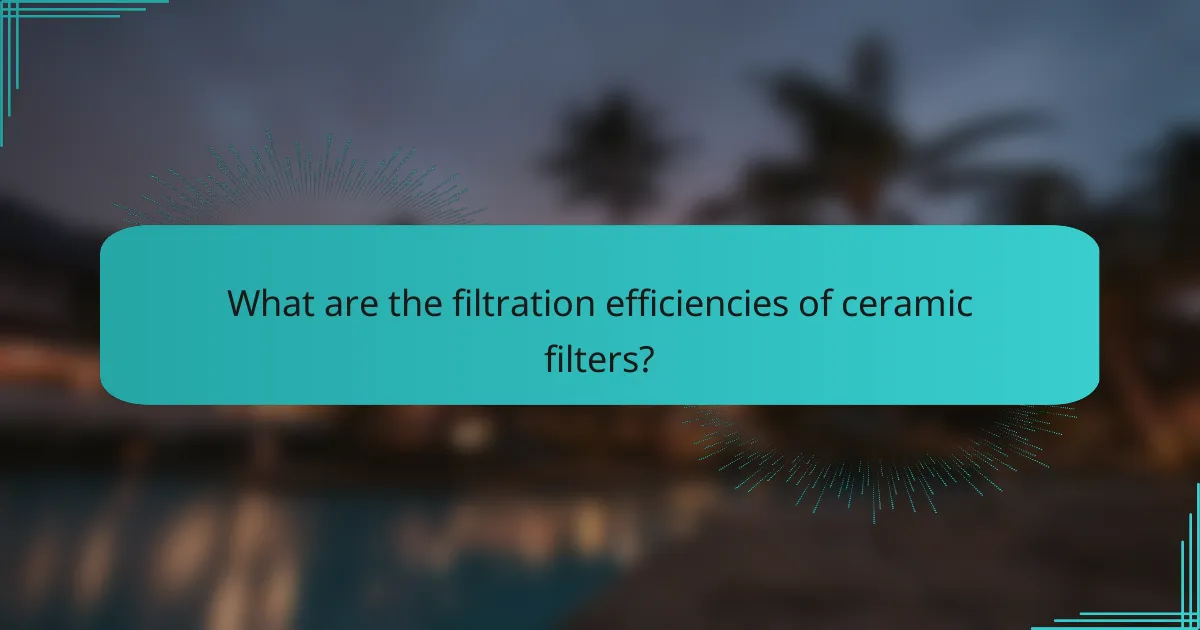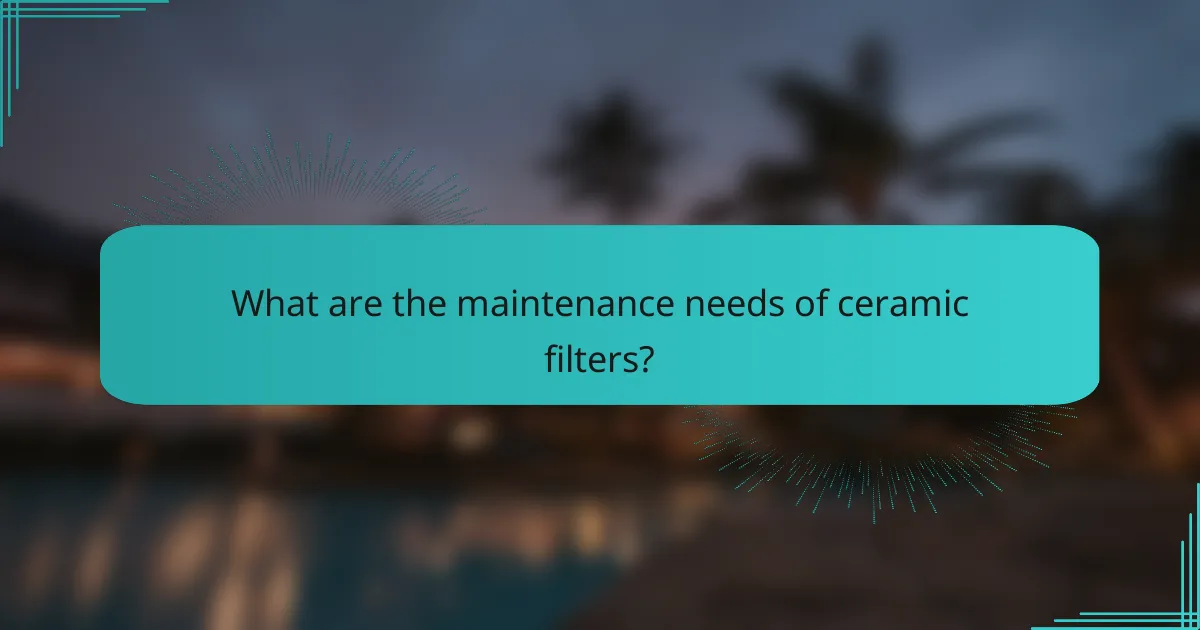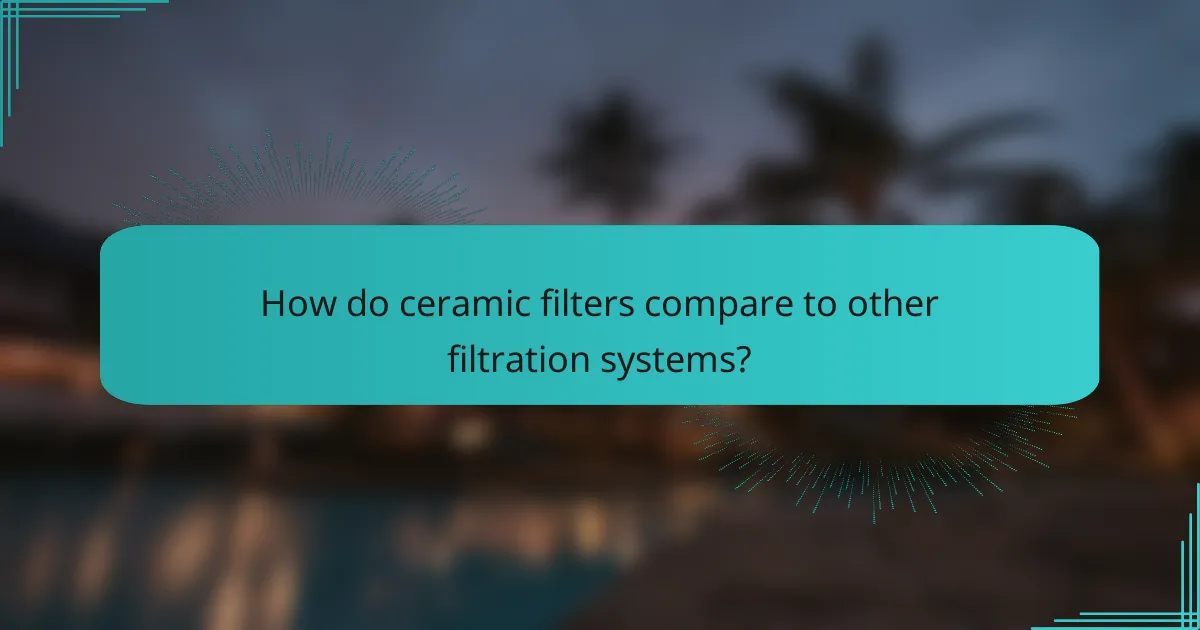Ceramic filters offer exceptional filtration efficiency, effectively removing a wide range of contaminants from water. Known for their durability, these filters can last for years with proper maintenance, making them suitable for both household and industrial use. Regular upkeep, including cleaning and monitoring for wear, is essential to maintain their performance and extend their lifespan.

What are the filtration efficiencies of ceramic filters?
Ceramic filters are highly effective at removing contaminants from water, achieving significant filtration efficiencies for various impurities. Their performance can vary based on factors such as pore size and maintenance, making them a versatile option for both household and industrial applications.
High removal rates for bacteria
Ceramic filters are known for their ability to remove a high percentage of bacteria from water, often exceeding 99%. This efficiency is primarily due to their small pore sizes, which physically block bacteria while allowing water to pass through.
When selecting a ceramic filter, look for products that meet established health standards, such as NSF/ANSI 53, which ensures effective removal of harmful microorganisms. Regular testing can help confirm the filter’s ongoing performance.
Effective against sediment and particulate matter
In addition to bacteria, ceramic filters excel at removing sediment and particulate matter from water. They can effectively trap dirt, sand, and other debris, contributing to clearer and cleaner water.
For optimal performance, it’s advisable to regularly clean the filter surface to prevent clogging. Depending on usage, this may be necessary every few weeks to maintain high filtration efficiency.
Variable performance based on pore size
The filtration efficiency of ceramic filters can vary significantly based on their pore size, typically ranging from 0.2 to 0.5 microns. Smaller pores generally provide better filtration but may require more frequent maintenance due to clogging.
When choosing a ceramic filter, consider the specific contaminants you need to address. A filter with a pore size of 0.2 microns may be ideal for areas with high bacterial contamination, while a larger pore size may suffice for sediment removal.

How durable are ceramic filters?
Ceramic filters are known for their impressive durability, often lasting several years with proper maintenance. Their robust construction allows them to withstand various environmental conditions, making them a reliable choice for filtration needs.
Long lifespan with proper care
With appropriate care, ceramic filters can last anywhere from 5 to 10 years or more. Regular cleaning and timely replacement of any damaged components are essential to maximize their lifespan. Users should follow manufacturer guidelines to ensure optimal performance and longevity.
It’s advisable to inspect the filter periodically for signs of wear or clogging. A simple rinse under running water can often restore functionality, preventing the need for premature replacement.
Resistance to chemical degradation
Ceramic filters exhibit strong resistance to chemical degradation, making them suitable for various applications, including water purification. They can handle a range of pH levels and are less likely to corrode compared to other materials like plastic or metal.
This resistance means that ceramic filters can maintain their structural integrity even when exposed to harsh chemicals, ensuring consistent filtration efficiency over time. However, it’s still important to avoid exposing them to extreme chemicals that could compromise their effectiveness.
Impact of physical damage on durability
Physical damage can significantly impact the durability of ceramic filters. Cracks or chips can lead to reduced filtration performance and potential contamination of the filtered water. Users should handle these filters with care to avoid dropping or striking them against hard surfaces.
If a ceramic filter does sustain physical damage, it is crucial to replace it immediately. Continuing to use a damaged filter can compromise water quality and pose health risks, making regular inspections a wise practice for all users.

What are the maintenance needs of ceramic filters?
Ceramic filters require regular maintenance to ensure optimal filtration efficiency and longevity. Key maintenance tasks include routine cleaning, monitoring replacement frequency, and recognizing signs of wear that indicate when a filter should be replaced.
Regular cleaning procedures
To maintain ceramic filters, regular cleaning is essential. Typically, filters should be cleaned every few weeks, depending on usage and water quality. A simple method involves rinsing the filter with clean water to remove accumulated debris and contaminants.
For more thorough cleaning, soak the filter in a mild vinegar solution for about 30 minutes, then rinse it thoroughly. Avoid abrasive materials that can damage the ceramic surface.
Replacement frequency guidelines
The replacement frequency of ceramic filters can vary based on factors such as water quality and usage patterns. Generally, filters should be replaced every 6 to 12 months to maintain effective filtration. However, if the filter shows significant wear or reduced flow rates, it may need to be replaced sooner.
It’s advisable to keep track of the filter’s usage and condition, as this will help determine the right time for replacement. Regularly checking the manufacturer’s recommendations can also provide guidance.
Signs of wear and when to replace
Common signs of wear in ceramic filters include visible cracks, discoloration, or a noticeable decrease in water flow. If you observe any of these indicators, it’s crucial to consider replacing the filter to ensure continued effectiveness.
Additionally, if the filter requires more frequent cleaning or if the water tastes or smells off, these may be signs that the filter is no longer functioning properly. Regular inspections can help catch these issues early, preventing potential health risks.

How do ceramic filters compare to other filtration systems?
Ceramic filters are known for their effective filtration efficiency and durability, making them a strong alternative to various filtration systems. They typically outperform many other methods in removing bacteria and sediments while requiring less frequent maintenance.
Comparison with activated carbon filters
Ceramic filters excel in filtering out pathogens and larger particles, while activated carbon filters are more effective at removing chemicals and improving taste. Ceramic filters can eliminate up to 99% of bacteria, whereas activated carbon primarily targets chlorine and volatile organic compounds.
In terms of lifespan, ceramic filters can last several years with proper care, while activated carbon filters usually need replacement every few months. This longevity makes ceramic filters a cost-effective option in the long run.
Advantages over reverse osmosis systems
Ceramic filters offer several advantages compared to reverse osmosis (RO) systems, particularly in terms of maintenance and water waste. Unlike RO systems, which can waste several gallons of water for every gallon filtered, ceramic filters operate with minimal water wastage.
Additionally, ceramic filters are generally easier to maintain, requiring only periodic cleaning to remove accumulated contaminants. This simplicity makes them an attractive choice for households looking for efficient and low-maintenance water filtration solutions.

What factors should be considered when choosing a ceramic filter?
When selecting a ceramic filter, consider water quality, filter size, and installation costs. These factors significantly influence the filter’s efficiency, longevity, and overall performance.
Water quality and source
The quality of the water and its source are crucial when choosing a ceramic filter. Different filters target specific contaminants, such as bacteria, sediment, or heavy metals. For instance, if your water comes from a well, you may need a filter that effectively removes sediment and pathogens.
Testing your water for contaminants can help determine the right ceramic filter. Look for filters that meet local safety standards and are certified for the specific impurities present in your water supply.
Filter size and capacity
Filter size and capacity directly affect how much water can be processed and how often maintenance is required. Smaller filters may be suitable for individual households, while larger systems are better for commercial use. Consider your daily water consumption when selecting the appropriate size.
Additionally, check the filter’s flow rate, which indicates how quickly it can purify water. A higher flow rate is beneficial for larger families or businesses, while a lower rate may suffice for smaller households.
Cost considerations for installation
Installation costs for ceramic filters can vary widely based on the system’s complexity and the required plumbing modifications. Basic countertop models may be more affordable, while whole-house systems can be a significant investment. Budget for both the initial purchase and any potential installation fees.
Consider long-term costs as well, such as replacement filters and maintenance. Some ceramic filters have longer lifespans and lower replacement costs, making them more economical over time. Always compare the total cost of ownership before making a decision.

What are the best ceramic filter brands available in the UK?
Some of the top ceramic filter brands in the UK include British Berkefeld, Doulton, and AquaCera. These brands are known for their reliability, filtration efficiency, and durability, making them popular choices for both home and commercial use.
British Berkefeld products
British Berkefeld offers a range of ceramic filters that are highly regarded for their effectiveness in removing contaminants from water. Their products typically feature a robust design, which enhances their lifespan and overall performance.
One of the standout features of British Berkefeld filters is their ability to remove bacteria and sediment while retaining essential minerals. This balance makes them suitable for various applications, from household use to emergency preparedness.
When considering British Berkefeld products, it’s essential to evaluate the specific model based on your filtration needs. Regular maintenance, such as cleaning the ceramic elements, can significantly extend the filter’s life and ensure optimal performance.


